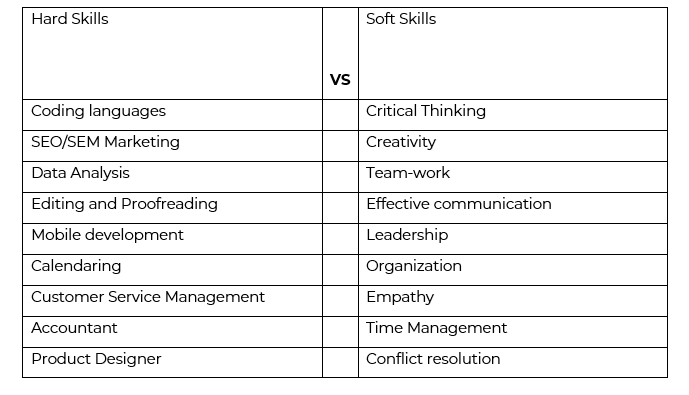
In a job hunt, your skills matter. There is no trick to it, and we can generally divide every skill into two categories: Hard skills and Soft skills.
In most job descriptions, employers and hiring managers usually ask and look out for both skills. A combination of both skills can be lethal – in a good way – for landing the next job or gig. They tell potential employers what you can do, how you can do it, and – to an extent – who you are.
So, what are hard skills and soft skills?
Hard skills are learned abilities developed from education, vocational training, courses, and practice. That is to say, nobody is born with a hard skill so a potential employer citing one must support it with a certification, degree, or qualification.
These skills are usually centered on specific abilities such as technical skills, computer skills, marketing skills, analytical skills, writing skills, project management skills, design skills among others.
For example, a hard skill for a software developer is Python programming language, for an accountant is account analysis skill, and for a bartender is drink mixing skill.
Employers and recruiters usually lookout for hard skills in professional resumes because they confirm potential employees’ output and performance, and overall contribution to the company’s growth.
Possessing a hard skill generally shows that you are great for a specific role or job, however, they don’t necessarily translate into business success as you also need to possess another skill set, namely, soft skills to support overall satisfaction.
Soft skills, on the other hand, are a broad set of transferable skills that are crucial for success in the workplace. A person’s soft skills are innate and more in tune with their personality and relate to how they work.
They include social skills, communication skills, emotional skills, and people skills ability to work as a team, patience, flexibility, and time management.
Although they are a part of your personality, you can learn new ones. Possessing a soft skill shows that you are perfect for a specific role or job, translate into workplace success and support overall satisfaction.
Employers and hiring managers usually search for candidates who possess soft skills as it is the driving force behind any company’s success it translates to more success in the workplace. Furthermore, a LinkedIn study reveals that a slight majority of employers rate soft skills over hard skills.
For example, an employer will preferably give the job to a highly-skilled, emotionally intelligent, and communicative candidate than an equally skilled, socially awkward one.
In another example, an employee who is excellent at programming but doesn’t have time management skills might not be popular with the boss.
Additionally, soft skills are particularly essential in customer-based roles. It takes several soft skills set to be able to listen to unsatisfied customers – sometimes grumpy – and provide them with polite and satisfactory service.
To summarize, hard skills focus on practical abilities while soft skills focus on behaviors and personalities, and in the hard skills VS soft skills battle, it’s safe to conclude that hard skills land the interviews whereas soft skills land the jobs.
Below is a tabular representation of both skill sets. (It might help if we could get this in a graphic design)


Leave A Comment